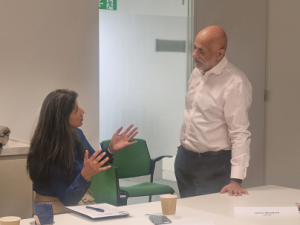Time to Talk – mental health and the role of digital
February 7, 2019It’s time to talk about mental health

Mental health problems affect one in four of us, yet people are still afraid to talk about it. Time to Talk day encourages everyone to talk about mental health and at the HIN we’re bringing digital innovators and clinicians together to identify solutions, says Amy Semple.
Time to Talk day is about encouraging everyone to talk about mental health. Last week, the Health Innovation Network started the conversation early with the sometimes contentious topic of digital. In our experience working with both NHS stakeholders and digital companies, there remains some scepticism and reticence amongst both groups on how they can work together to benefit the 1 in 4 of the population who are currently experiencing mental health issues. So what better way to open up the channels of communication than to invite 100 key decision makers and innovators to spend the day discussing the opportunities and challenges of maximising digital opportunities in mental health, together.
The NHS Long Term Plan
The stars (at least on paper) have recently aligned in terms of national strategy, with the NHS Long Term Plan having digital at its core and a strong focus on mental health. I believe that success in both areas will be mutually dependent. To date, most digital companies, in my experience, have targeted primary care and the acute sector as this has often been the easiest way to prove their concept. Digital interventions available in the NHS are associated with benefits such as improved access to services, online self-help and therapies, prevention and organisational efficiencies.
When speaking to some companies prior to the event I felt that mental health was perhaps outside their comfort zone, seemed too large and unwieldly to take on, or wasn’t acknowledged as a viable space for their product. This is understandable. Stigma surrounding mental health means that many people believe that people with a mental health condition are unable to self-manage and will struggle to maintain the consistency needed to use some technologies. These viewpoints only sustain the inequalities we continue to see in terms of people with mental health conditions gaining equal access to services and support with physical health conditions. Mental health services can be equally cautious of digital solutions, often concerned about the ethical implications of removing the human face to face element in mental health care without putting people at risk.
Maximising digital opportunities
With our Maximising Digital in Mental Health event we created a space to encourage a healthy debate to air these concerns. To get the people who could really effect change talking to each other. We invited national and local leaders to set out their digital strategies, we presented real life examples where digital companies are already working successfully within mental health and we showcased digital companies not yet working in mental health whose products have relevance to the sector in terms of patient care or organisational efficiencies. The result; a two-way conversation where both sides could speak openly and honestly about their fears as well as their excitement at the potential to radicalise mental health care with digital technology. Honest dialogue, open conversations and exploration of the solutions were met with a real appetite for adoption and lateral thinking.
Reducing the inequality in mental health
Yes, there were challenges highlighted, barriers questioned and a little bit of scepticism still; but overwhelmingly there was positivity and real desire to work together. We know that people with serious mental illness are likely to die on average 15-20 years earlier than other people and two thirds of these deaths are from avoidable physical illnesses. It’s time to talk; to find a safe and cost-effective way for users of mental health services to benefit from digital solutions and reduce this inequality. As Liz Ashall-Payne from ORCHA eloquently phrased it, “the conversation [in the room] has moved from not if, but when.”
Time to keep talking
From the dialogue on the day, I believe there are three key next steps to the conversation:
1. Get the decision makers on board. Talking to the right people who are influential in ensuring digital is part of mental health strategy and decision making process, such as Innovation Teams, CCGs, Strategy Teams, Board Members, Systems and Information Teams will ensure digital stays on the agenda.
2. Engage with front line staff. Unless you engage the people who will be using digital technologies, they simply won’t get used. Asking them what solutions they need, what their preferences are working in true partnership with staff and users will secure the buy-in needed to test ideas.
3. Consider the system implications. Interoperability is a huge challenge and needs to be overcome with commitment and responsibility from both organisations and digital companies to make this happen. Put simply, we need to ensure that the systems being able to talk to each other is also part of the conversation.
Enjoy this blog? Then we think you’d also like:
Maximising Digital Opportunities in Mental Health: programme and slide pack
Digital is helping us tackle healthcare inequalities, but the real issues are deeper and run system-wide
Digital is a valuable tool for prevention – and so rightly it’s at the heart of the long term plan
For more information on the Health Innovation Network’s Mental Health theme, click here.
